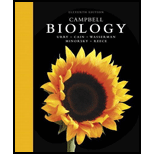
Campbell Biology (11th Edition)
11th Edition
ISBN: 9780134093413
Author: Lisa A. Urry, Michael L. Cain, Steven A. Wasserman, Peter V. Minorsky, Jane B. Reece
Publisher: PEARSON
expand_more
expand_more
format_list_bulleted
Textbook Question
Chapter 32.3, Problem 2CC
Compare three aspects of the early development of a snail (a mollusc) and a human (a chordate).
Expert Solution & Answer
Want to see the full answer?
Check out a sample textbook solution
Students have asked these similar questions
Green Algae, as a group, is actually paraphyletic with one subgroup more closely related to higher plants than the other. Which of the following green algae groups is more closely related to higher plants:
a. Charophyceans
b. Chlorophyceans
c. Rhodophyta
d. Xanthophyceans
A single-celled green algal genus that is motile with 2 flagella, has a cup shaped chloroplast, and an eyespot:
a. Volvox
b. Chlamydomonas
c. Euglena
d. Codium
A[n] ___ is produced by members of the Myxomycota when there is a lack of moisture.
a. plasmodiocarp
b. aethalium
c. sclerotium
d. plasmodium
Chapter 32 Solutions
Campbell Biology (11th Edition)
Ch. 32.1 - Summarize the main stages of animal development....Ch. 32.1 - WHAT IF? What animal characteristics would be...Ch. 32.2 - Put the following milestones in animal evolution...Ch. 32.2 - VISUAL SKILLS Explain what is represented by the...Ch. 32.2 - MAKE CONNECTIONS Evaluate whether the origin of...Ch. 32.3 - Distinguish the terms grade and clade.Ch. 32.3 - Compare three aspects of the early development of...Ch. 32.3 - Prob. 3CCCh. 32.4 - Prob. 1CCCh. 32.4 - WHAT IF? Suppose ctenophores are basal metazoans...
Ch. 32.4 - Prob. 3CCCh. 32 - Prob. 32.1CRCh. 32 - What caused ihe Cambrian exploston? Describe...Ch. 32 - Describe how body plans provide useful Information...Ch. 32 - Prob. 32.4CRCh. 32 - Prob. 1TYUCh. 32 - The distinction between sponges and other animal...Ch. 32 - Prob. 3TYUCh. 32 - Prob. 4TYUCh. 32 - EVOLUTION CONNECTION A professor begins a lecture...Ch. 32 - SCIENTIFIC INQUIRY INTERPRET THE DATA Redraw the...Ch. 32 - WRITE ABOUT A THEME: INTERACTIONS Animal life...Ch. 32 - SYNTHESIZE YOUR KNOWLEDGE This organism is an...
Knowledge Booster
Learn more about
Need a deep-dive on the concept behind this application? Look no further. Learn more about this topic, biology and related others by exploring similar questions and additional content below.Similar questions
- Which of the following is not true about the life-cycle of Fucus. a. 8 eggs per oogonium b. 64 sperm per antheridium c. eggs are flagellated d. sperm are flagellatedarrow_forwardGreen Algae, as a group, is actually paraphyletic with one subgroup more closely related to higher plants than the other. Which of the following green algae groups is more closely related to higher plants: a. Charophyceans b. Chlorophyceans c. Rhodophyta d. Xanthophyceansarrow_forwardCertain toxic terpenoids in this group is thought to deter herbivory but may also have some anti-tumor activity? a. green algae b. brown algae c. red algae d. golden algae e. none of thesearrow_forward
- In the cellular slime molds, the most common phase is: a. plasmodium b. pseudoplasmodial c. single cells as myxamoebae d. moundingarrow_forwardWhich of the following descriptive terms does not describe Hydrodictyon? a. colonial b. nonmotile c. 1 large reticulated chloroplast in each cell d. all of these describe Hydrodictyonarrow_forwardWhich of the following does not apply to Chara? a. "stoneworts" b. isogamous c. calcified walls d. apical growth with an axis and branchesarrow_forward
arrow_back_ios
SEE MORE QUESTIONS
arrow_forward_ios
Recommended textbooks for you
 Biology (MindTap Course List)BiologyISBN:9781337392938Author:Eldra Solomon, Charles Martin, Diana W. Martin, Linda R. BergPublisher:Cengage Learning
Biology (MindTap Course List)BiologyISBN:9781337392938Author:Eldra Solomon, Charles Martin, Diana W. Martin, Linda R. BergPublisher:Cengage Learning Concepts of BiologyBiologyISBN:9781938168116Author:Samantha Fowler, Rebecca Roush, James WisePublisher:OpenStax College
Concepts of BiologyBiologyISBN:9781938168116Author:Samantha Fowler, Rebecca Roush, James WisePublisher:OpenStax College Biology Today and Tomorrow without Physiology (Mi...BiologyISBN:9781305117396Author:Cecie Starr, Christine Evers, Lisa StarrPublisher:Cengage Learning
Biology Today and Tomorrow without Physiology (Mi...BiologyISBN:9781305117396Author:Cecie Starr, Christine Evers, Lisa StarrPublisher:Cengage Learning Biology 2eBiologyISBN:9781947172517Author:Matthew Douglas, Jung Choi, Mary Ann ClarkPublisher:OpenStax
Biology 2eBiologyISBN:9781947172517Author:Matthew Douglas, Jung Choi, Mary Ann ClarkPublisher:OpenStax Biology: The Unity and Diversity of Life (MindTap...BiologyISBN:9781337408332Author:Cecie Starr, Ralph Taggart, Christine Evers, Lisa StarrPublisher:Cengage Learning
Biology: The Unity and Diversity of Life (MindTap...BiologyISBN:9781337408332Author:Cecie Starr, Ralph Taggart, Christine Evers, Lisa StarrPublisher:Cengage Learning

Biology (MindTap Course List)
Biology
ISBN:9781337392938
Author:Eldra Solomon, Charles Martin, Diana W. Martin, Linda R. Berg
Publisher:Cengage Learning

Concepts of Biology
Biology
ISBN:9781938168116
Author:Samantha Fowler, Rebecca Roush, James Wise
Publisher:OpenStax College

Biology Today and Tomorrow without Physiology (Mi...
Biology
ISBN:9781305117396
Author:Cecie Starr, Christine Evers, Lisa Starr
Publisher:Cengage Learning


Biology 2e
Biology
ISBN:9781947172517
Author:Matthew Douglas, Jung Choi, Mary Ann Clark
Publisher:OpenStax

Biology: The Unity and Diversity of Life (MindTap...
Biology
ISBN:9781337408332
Author:Cecie Starr, Ralph Taggart, Christine Evers, Lisa Starr
Publisher:Cengage Learning
Embryology | Fertilization, Cleavage, Blastulation; Author: Ninja Nerd;https://www.youtube.com/watch?v=8-KF0rnhKTU;License: Standard YouTube License, CC-BY